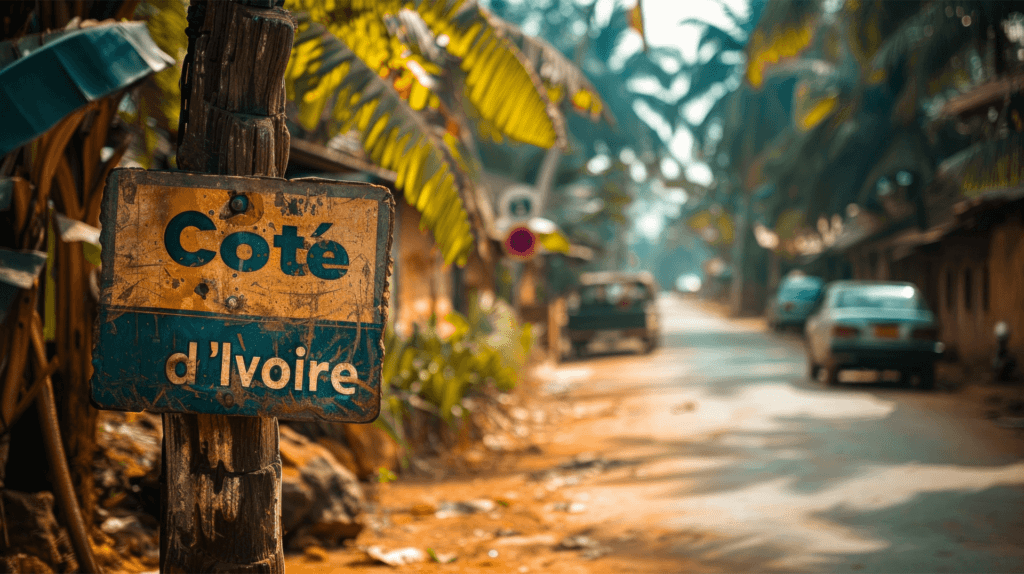I had the incredible opportunity to explore the stunning Ivory Coast in West Africa, and let me tell you—it was an adventure filled with surprises and delights! When I first arrived, I admittedly had some apprehensions about the conditions and concerns like malaria, but those worries quickly faded away as I discovered the warmth and hospitality of the Ivorian people, savored the delicious local cuisine, and immersed myself in the rich culture. Spending a week in this captivating country allowed me to uncover hidden gems, relax on breathtaking beaches, and embrace the vibrant spirit of the Ivory Coast. Join me as I share my experiences and tips for an unforgettable journey in this beautiful corner of West Africa!
Table of Contents
Is Ivory Coast safe to visit?
If you’re considering a trip to the Ivory Coast, it’s important to prioritize your safety and well-being. While the country offers incredible experiences, it’s essential to stay informed about current conditions. Before traveling, I recommend checking with your country’s State Department or equivalent travel advisory service for the latest updates and safety recommendations. By staying aware and prepared, you can make the most of your visit to this beautiful destination while ensuring a safe and enjoyable journey.
Is Ivory Coast Worth Visiting?
Absolutely, the Ivory Coast is worth visiting for those seeking an authentic and enriching travel experience. This West African nation boasts a diverse range of attractions, from stunning beaches along the Gulf of Guinea to vibrant cities like Abidjan and historic sites such as the UNESCO-listed Grand-Bassam. The country’s rich culture is reflected in its music, art, and cuisine, offering visitors a chance to immerse themselves in local traditions. While it’s important to stay informed about safety and health considerations, exploring the Ivory Coast can be incredibly rewarding for adventurous travelers looking to discover a lesser-known gem in Africa.
Introduction
Ivory Coast, officially the Republic of Côte d’Ivoire, is a country on the southern coast of West Africa. It borders Guinea and Liberia to the west, Burkina Faso and Mali to the north, Ghana to the east, and the Gulf of Guinea to the south.
Quick Facts
- Capital: Yamoussoukro
- Population: 27.7 million
- Official Language: French
- Currency: West African CFA franc
Overview
Ivory Coast has a diverse landscape, from its mountainous regions in the northwest to the coastal plains along the Gulf of Guinea. The country was once considered the economic powerhouse of West Africa due to its production of cocoa. However, political instability and civil war during the early 2000s damaged the economy. Today, Ivory Coast is recovering and working to diversify into other industries like tourism.
History
The history of Ivory Coast begins with its pre-colonial era where the land was home to several kingdoms and tribes. In the 15th-16th centuries, European ships began trading for slaves along the coast. France took control of the region in the late 19th century and it became an official French colony in 1893 named Côte d’Ivoire. The country gained independence from France in 1960. Its first president, Félix Houphouët-Boigny, ruled for over 30 years until his death in 1993. Political turmoil followed for over a decade including a civil war in 2002 that split the country. Since 2011, Ivory Coast has been relatively stable under President Alassane Ouattara.
Main Attractions
Some of Ivory Coast’s top attractions include:
- Grand-Bassam Historic Town: A UNESCO World Heritage site and the country’s first colonial capital.
- Basilica of Our Lady of Peace: A stunning basilica in the political capital of Yamoussoukro.
- Tai National Park: A lush rainforest park home to chimpanzees, pygmy hippos, and elephants.
- Assagny National Park: Known for its beaches, lagoons, and traditional villages.
- Abidjan: The economic center with museums, markets, nightlife, and beautiful lagoonside scenery.
- Beaches: Ivory Coast boasts some of West Africa’s most beautiful beaches along its 300 mile coastline.
Top Beaches in Ivory Coast
Ivory Coast is home to some of the most beautiful beaches in West Africa. From lively resort towns to secluded hideaways, there are plenty of stunning stretches of sand to discover. Here are some of the top beaches to check out on your visit:
Grand-Bassam
Located about 30km east of Abidjan, Grand-Bassam is one of the most popular beach destinations in Ivory Coast. This former colonial capital has a relaxed, laidback vibe and a long stretch of golden sand beach lined with coconut palms. Take a stroll through the historic colonial district, check out the local artisan market, or relax at one of the beachfront restaurants and hotels. The beach here is generally safe for swimming.
Assinie
Assinie is a small fishing village about 80km east of Abidjan that has become a trendy weekend getaway spot. The beautiful white sand beach stretches for miles and is dotted with palm trees, providing plenty of shade. The beach has soft waves, making it a nice spot for swimming and water sports. You can also take a boat trip to explore the nearby Banco National Park.
Adiaké
For a more secluded beach escape, head to Adiaké, located west of Assinie. The idyllic beach here is quiet and unspoiled, with hardly any major development. Swaying palm trees provide shade as you lounge on the soft white sand beach and take in views of the turquoise water. The beach is generally safe for swimming. Adiaké offers a peaceful and relaxing beach experience away from the crowds.
Biétry
Biétry is a small sleepy fishing village about 100km west of Abidjan near the border with Ghana. Its beach is an off-the-beaten path destination with beautiful golden sand and calm waters. Relax in a beachfront cabana, try your hand at fishing, or explore the lush palm groves backing the beach. With far fewer tourists than other beaches, Biétry offers a more authentic local experience.
Sassandra
On the far western border with Liberia, Sassandra is home to Ivory Coast’s longest beach. The seemingly endless stretch of shoreline features soft white sand and swaying palm trees as far as the eye can see. The beach is great for seaside strolls, swimming, and water sports when conditions allow. Nearby, you can also tour rubber tree plantations or visit the Catholic basilica overlooking the beach.
Grand-Bassam
Grand-Bassam is located about 30 km east of Abidjan on the Gulf of Guinea. It was the French colonial capital of Côte d’Ivoire until 1900 and is renowned for its historic colonial architecture.
With its sandy beaches and palm trees, Grand-Bassam has a relaxed, tropical vibe. The main beach stretches over 3 km and is a popular spot for swimming and water sports like surfing, kayaking, and stand-up paddleboarding. Local vendors sell fresh coconuts, fruit, and grilled seafood along the beachfront.
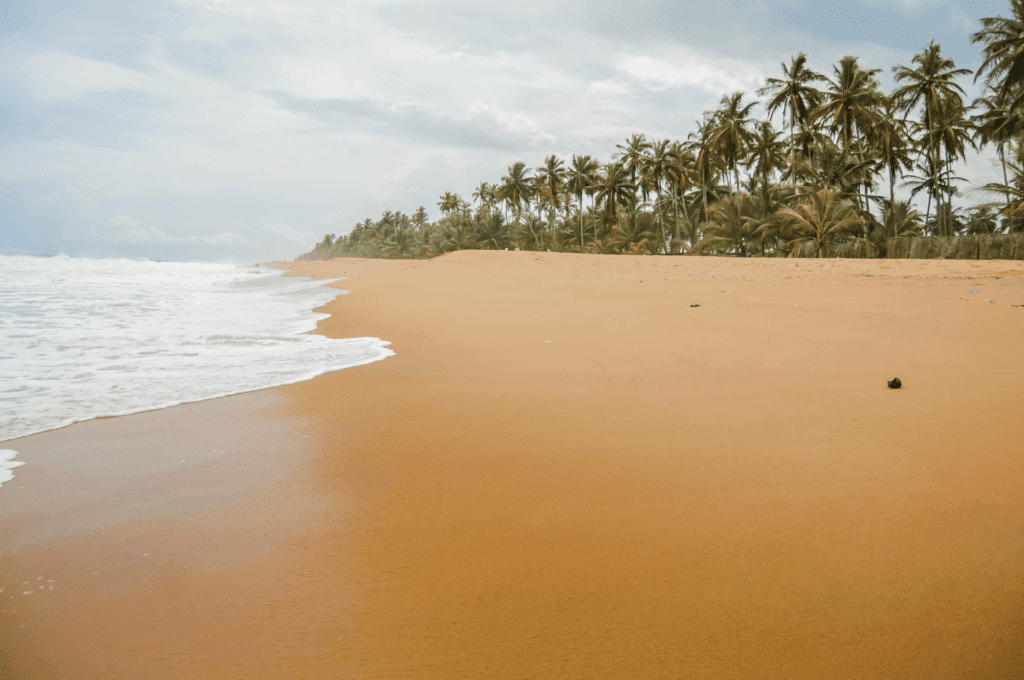
Some activities and sights in Grand-Bassam include:
- The Colonial Quarter with old French colonial buildings, like the cathedral and old governor’s palace
- Traditional N’Zima fishing village with wooden huts on stilts
- Musée National with exhibits on the colonial era and artifacts
- Le Centre Artisanal for shopping handmade masks, woodcarvings, jewelry
- Boat trips to Assouindé wildlife reserve to see monkeys, crocodiles, and birds
The main hotels in Grand-Bassam are Hotel Boblin la Mer, Hotel Whala, and Hôtel de la Poste which are located right on the beach. There are also several small locally-owned auberges and guesthouses in town for more budget-friendly stays. The best time to visit is November to April during the dry season.
Assinie
Located 90 km east of Abidjan, Assinie is one of Ivory Coast’s most beautiful beaches. It stretches for nearly 20km along the Atlantic coastline.
The beach has fine white sand and is lined with palm trees, making it an idyllic tropical getaway. The ocean waters are calm and perfect for swimming. There are also some small islands located just offshore that can be accessed by local pirogue boats.
Some of the main activities in Assinie include:
- Swimming and sunbathing on the beach
- Boat trips to the nearby islands
- Fishing
- Walking along the long sandy beach
- Trying local seafood at beachfront restaurants
Assinie has a selection of beach resorts and bungalow-style hotels right on the sand. Some top options include:
- Hotel Le Baobab
- Résidence Assinie Beach
- Résidence Bel Azur
- Le Picolo
These hotels offer comfortable rooms just steps from the beach, as well as amenities like outdoor pools, restaurants, and beach bars. It’s the ideal place to stay for a relaxing beach vacation.
Assinie provides the quintessential Ivory Coast beach experience, with its picturesque shoreline, island-dotted ocean views, and laidback coastal atmosphere. It’s a must-visit destination for any beach lover visiting Ivory Coast.
Adiaké
Located along the southern coast of Ivory Coast, Adiaké offers stunning white sand beaches and lush palm groves. The small fishing village sits on a narrow sandbar between the Ébrié Lagoon and the Atlantic Ocean.
Adiaké is known for its peaceful atmosphere and slow pace of life. Traditional wooden pirogues line the shores while fishermen cast their nets into the lagoon. The beaches provide plenty of space to relax under the sun or take long strolls at sunset. The calm, clear waters are ideal for swimming and snorkeling.
Some of the top activities in Adiaké include:
- Relaxing on the beach
- Snorkeling and swimming
- Canoeing through the mangrove forests
- Visiting Adiaké Church, a historic Catholic church built in 1910
- Exploring the nearby Assagny National Park
Accommodation options are limited but feature traditional beach bungalows. Popular options include:
- Le Bacon de Mer – Simple bungalows right on the beach with a restaurant serving fresh seafood.
- Keur Saloum – Small family-run hotel with a lush garden and basic rooms.
- Villa Mandji – Upscale beachfront villa for rent, includes private chef and guide.
With its remote location and lack of crowds, Adiaké offers a peaceful escape in a traditional Ivorian fishing village. Travelers are rewarded with empty stretches of windswept beach and warm Ivorian hospitality.
Biétry
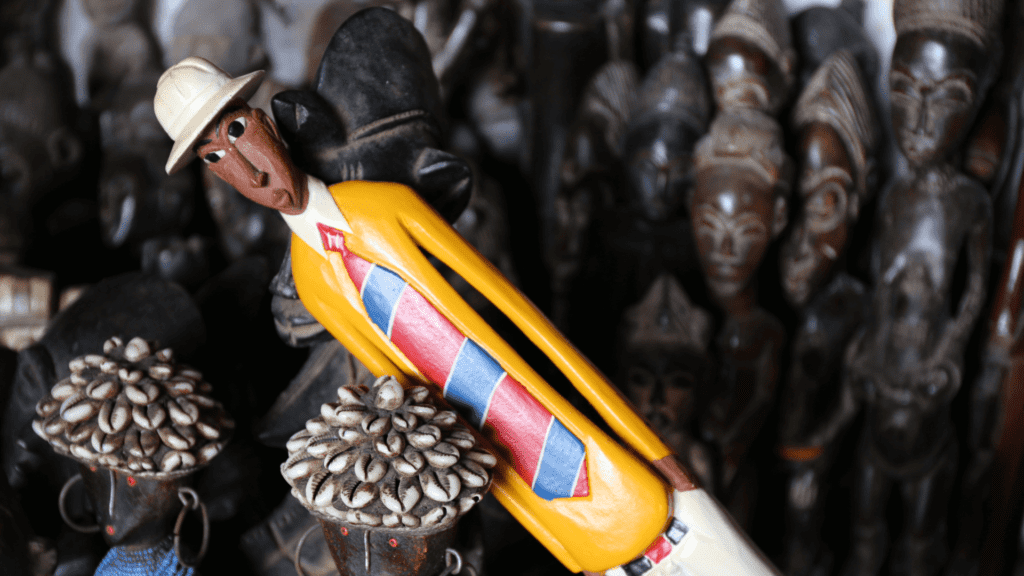
Located near the town of Grand-Lahou, Biétry is one of the top beaches in Ivory Coast. Known for its picturesque landscape, Biétry offers visitors pristine white sand beaches and clear turquoise waters. The beach stretches over 7km and is lined with palm trees that provide shade from the hot African sun.
Biétry is an excellent spot for swimming, snorkeling, kayaking, and other water sports. The beach has a gentle slope and calm waters, making it safe for swimmers. Snorkelers can spot colorful fish and coral reefs teeming with marine life just offshore. For the adventurous, kiteboarding and windsurfing are popular activities to enjoy the constant ocean breezes.
Onshore, beachgoers can relax under thatch-roofed cabanas or grab a bite to eat at local restaurants serving fresh seafood dishes. Vendors stroll the beach selling souvenirs, snacks, and cold drinks. Accommodation options range from beach bungalows to luxury resorts. Popular picks include Hotel Whala and Le Baobab Bleu Resort which offer oceanfront rooms and villas.
With its stunning scenery and range of activities, Biétry is a must-visit for those looking to experience the best of Ivory Coast’s spectacular beaches. The laidback atmosphere and natural beauty make it an ideal spot to unwind and enjoy the coastal lifestyle.
Sassandra
Located in the south-west of Ivory Coast, Sassandra is a port city known for its beautiful beaches. The main beach stretches over 7km and has fine white sand and turquoise waters. The beach is lined with palm trees providing shade.
Sassandra beach is a quieter alternative to the busier resort towns. There are no big hotels, just small guesthouses. It’s a relaxing place to unwind on the beach. The ocean current can be strong, so caution is advised when swimming.
Activities include swimming, sunbathing, beach walks, and boat trips. The Sassandra river meets the ocean here, which is good for fishing. The main fish caught are barracuda, tuna, and shrimp.
Some hotel recommendations in Sassandra include:
- La Madrague – small guesthouse with a French restaurant, located right on the beach.
- Le Calypso – beachfront hotel with a pool and bar overlooking the ocean.
- Le Baobab – budget hotel 5 minutes walk from the beach. Simple but comfortable rooms.
Sassandra offers a quieter, more laidback beach vacation compared to the big resorts. It’s ideal for relaxation, nature, and water activities like fishing and boating. The wide sandy beach and gentle waves make it great for swimming and long beach walks too.
Best Times to Visit Ivory Coast
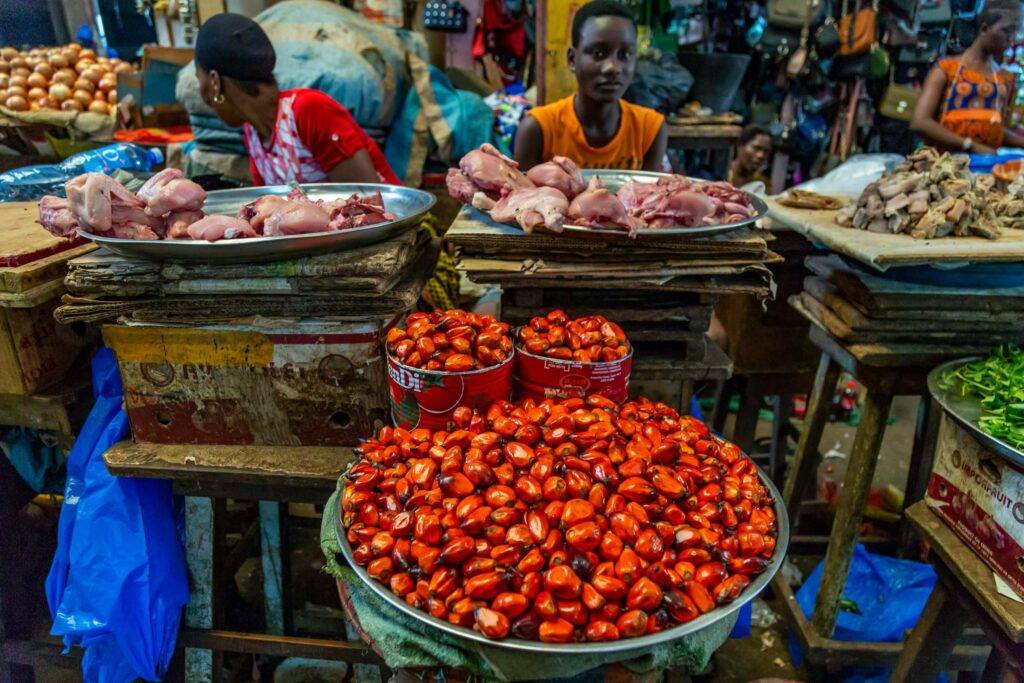
The best time to visit Ivory Coast is during the dry season from November to April when temperatures are warm and rainfall is minimal. The hottest months are February to April when temperatures can reach over 90°F (32°C). The rainy season runs from May to October with the heaviest rains in June and September.
Peak tourist season runs from November to January when European travelers flock to Ivory Coast to escape winter weather. Hotels fill up quickly and prices are higher during this period. If you’re looking for smaller crowds and lower prices, aim for the shoulder seasons in October or May.
Some of the top events and festivals in Ivory Coast include:
- Fêtes des Masques (Festival of Masks) – Held in November in the region of Man, this festival celebrates the artistry of traditional masks and costumes with dancing and music.
- Fête du Dipri – An annual harvest festival held in October in the village of Gomon. Visitors can witness traditional music and watch as the villagers offer up the year’s yam harvest.
- Fêtes des Ignames – Yam festivals take place across Ivory Coast in September and October to celebrate the yam harvest. The festivities include traditional dancing, music, and storytelling.
- Independence Day – August 7th marks Ivory Coast’s independence from France. The day is celebrated with parades, dancing, and street parties across the country.
- Fête de la Musique – Modeled after the French music festival, Fête de la Musique takes place each June 21st in Abidjan with free musical performances held on stages and streets throughout the city.
Getting Around
Public Transport
The public transportation system in Ivory Coast consists primarily of shared taxis and minibuses. The minibuses, known locally as “gbakas”, run set routes within and between major towns and cities. They are usually packed full of people and can be difficult to navigate if you’re not familiar with the complex route systems. Fares are very cheap, usually around 100-200 CFA per trip.
Taxis
Taxis are common in the major cities like Abidjan. There is no meter system so you’ll have to negotiate the fare with the driver before setting off. Taxis don’t normally cruise for passengers so you’ll need to call one or find a taxi stand. Make sure to settle on the fare before getting in to avoid any conflicts.
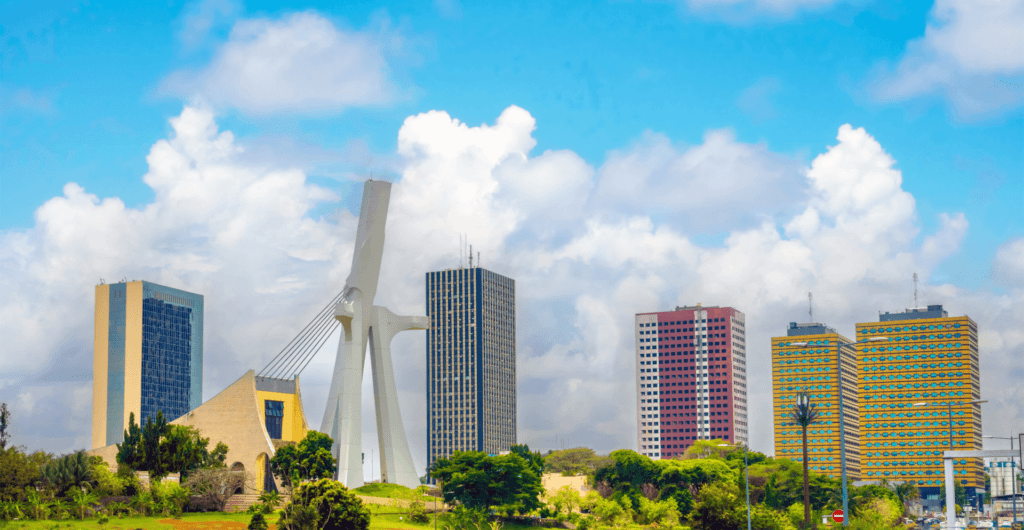
Driving
Driving yourself around Ivory Coast is possible if you’re comfortable driving in chaotic conditions. Roads are generally in poor condition. Driving standards are poor and accident rates are high. If you do choose to drive, get an International Driving Permit and be sure your insurance covers you in Ivory Coast. The roads are shared with pedestrians, bicycles and livestock so defensive driving skills are a must. Outside of the major cities, most roads are unpaved.
Safety Tips
Ivory Coast is generally safe, but it’s important to take some precautions, especially if you’re traveling alone or visiting crowded areas. Here are some tips to stay safe:
Common Scams
- Taxi scams – Only take official, metered taxis with clear pricing. Avoid accepting rides from unofficial taxis.
- Pickpockets – Be aware of your belongings in crowded markets and transport hubs. Keep valuables in secure pockets.
- Overcharging – Confirm prices before purchasing goods or services. Don’t pay more than the agreed amount.
Health Risks
- Malaria – Take antimalarial medication. Sleep under a mosquito net. Wear long sleeves and pants at dusk.
- Food safety – Only eat freshly cooked foods. Avoid uncooked vegetables and unpeeled fruits. Drink sealed bottled water.
- Heat exhaustion – Stay hydrated and limit time in direct sun during the hottest parts of the day.
Dangerous Areas
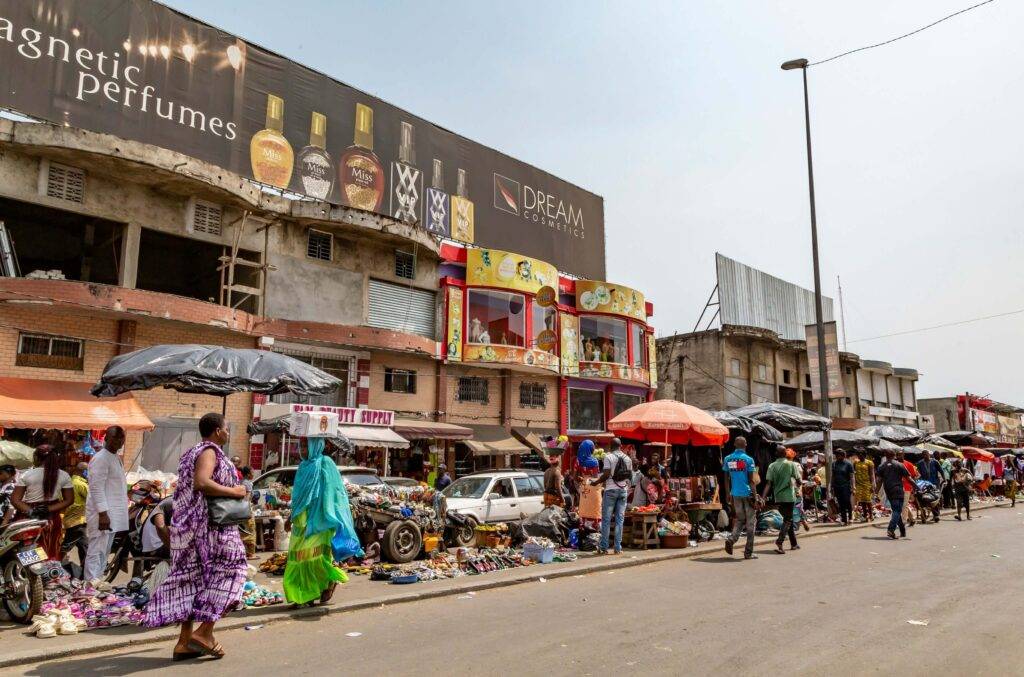
- Border regions – Avoid land borders with Liberia and Guinea, which can be unstable.
- Abidjan slums – Use caution in impoverished districts like Adjamé. Don’t flash expensive items.
- Beach scams – Women should not go to isolated sections of beaches alone due to reports of harassment.
Stay alert, avoid displaying wealth, and stick to well-lit major streets at night. Research your destination and register with your embassy. Use common sense, and enjoy your time in Ivory Coast!
Conclusion
In conclusion, visiting the Ivory Coast can be a remarkable and fulfilling experience, offering a glimpse into the vibrant culture and natural beauty of West Africa. However, it’s crucial to exercise caution and common sense while traveling in this region. Stay informed about local conditions, follow any travel advisories, and take necessary precautions to ensure your safety. Respect local customs and traditions, engage with the friendly Ivorian people, and savor the delicious cuisine while keeping your well-being a priority. With proper preparation and awareness, you can enjoy all that the Ivory Coast has to offer while having a safe and memorable journey. Safe travels!
Don’t forget to check our latest blog post The Art of Slow Travel in 7 easy steps: How to Savor Your Digital Nomad Journey to discover a transformative approach to travel that encourages mindfulness, authenticity, and the cultivation of unforgettable experiences.
